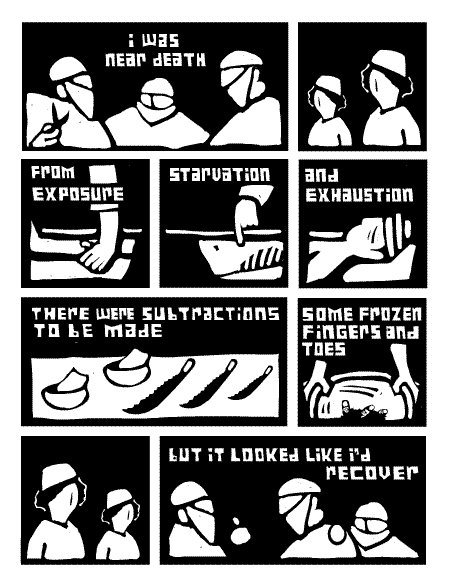“Conventionally, historical fiction is a personal story with world-historical rear-screen projection…. The protagonist is usually a reflector, not an actor, an ordinary man or woman whose life is blown off course by the storm of great events. This is the conventional method because it is the prudent method: the writer does not have to imagine what it was like to be Robert E. Lee or Abraham Lincoln, only what it might have been like to be a righteous but disillusioned Confederate deserter in love with a plucky girl.”
– Louis Menand, on Charles Frazier’s Cold Mountain

Darby was nice enough to give me a shoutout the other day, and mentioned that I was working on a graphic novel, and I thought, “oh crap…I am working on a graphic novel!” and proceeded to be very guilty about my output, much like I was when Gwenda said nice things about me a month or so ago. So today, I’m posting a several-months-old page from Calamity, for two reasons: one, to give everybody another taste of what i’m working on, and two, to try to get my ass into gear and continue the work.
* * *
Here’s a nice little NPR clip on The Virginia Quarterly Review that points out that part of its appeal is the strong attention to graphic elements and design (including comics) that Ted Genoways has brought to the journal.
* * *
This afternoon while I was eating lunch, I listened to a local radio show on the Ohio senate race, which, coincidentally, included Dan on its panel of speakers (because of his two recent NyTimes Op-Eds). I note this here because Dan mentioned one of my favorite essays ever, Charles Baxter’s “Dysfunctional Narratives, Or ‘Mistakes Were Made‘.” In the essay, Baxter talks about passive voice, and how it’s been used in American politics to deny accountability:
[The Reagan and Bush] administrations put the passive voice, politically, on the rhetorical map. In their efforts to acquire deniability on the arms-for-hostages deal with Iran, their administrations managed to achieve considerable notoriety for self-righteousness, public befuddlement about facts, forgetfulness under oath, and constant disavowals of political error and criminality, culminating in the quasi-confessional, passive voice–mode sentence, “Mistakes were made.”
He goes on:
[Speech like this creates] a climate in which social narratives are designed to be deliberately incoherent and misleading. Such narratives humiliate the act of storytelling. You can argue that only a coherent narrative can manage to explain public events, and you can reconstruct a story if someone says, “I made a mistake,” or “We did that,” but you can’t reconstruct a story—you can’t even know what the story is—if everyone is saying, “Mistakes were made.” Who made them? Well, everybody made them and no one did, and it’s history anyway, so we should forget about it. Every story is a history, however, and when there is no comprehensible story, there is, in some sense, no history; the past, under those circumstances, becomes an unreadable mess. When we hear words like “deniability,” we are in the presence of narrative dysfunction, a phrase employed by the poet C. K. Williams to describe the process by which we lose track of the story of ourselves, the story that tells us who we are supposed to be and how we are supposed to act.
The whole essay is brilliant. Read it.
APPLY ASS TO CHAIR!!!
till your fingers BLEED
PS – HEEEYYYY VICTOR
yes, yes!
oh god, was that a SMOKE SIGNALS reference?
yes, yes it was. now i eat pancakes.
i knew it
ah, “mistakes were made”. when that quote was explained to me, it marked the first time i realized grammar had power.